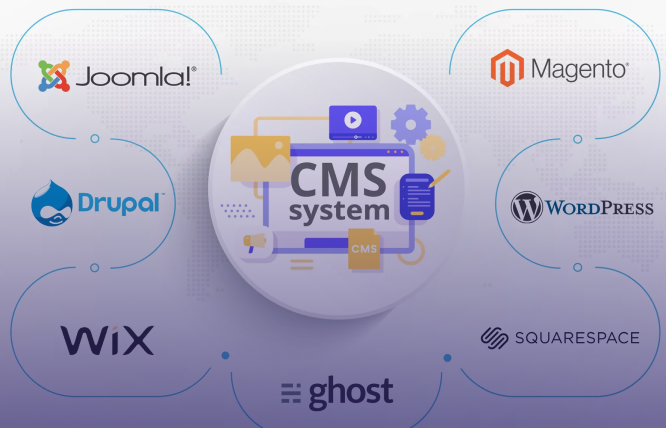Introduction
A CMS system play an important role when developing websites that you want ranked. In this article, we will discuss the top 5 CMS best for SEO and the benefits you can enjoy by choosing a CMS for your SEO practices.
Which CMS is Best for SEO?
A content management system can make a real difference when it comes to improving your SEO practices. Most organisations are already leveraging CMS to enhance their SEO and improve brand awareness. As of July 2024, there are over 73 million websites on the internet that are using a CMS and 28% of the top 1 million websites are e-commerce websites that leverage SEO to stay on top of SERP.
In this article, we will discuss the top 5 CMS for SEO and how they can help you gain a competitive edge in the saturated market.
Top CMS Best For SEO
There are several CMS in the market and the majority of websites are using these content management systems to ensure better SEO practices. When it comes to improving SEO for websites, the choice of content management system can significantly impact a site’s search engine visibility.
Here’s how some of the best CMS platforms help enhance SEO:
WordPress
WordPress is widely regarded as one of the best CMS platforms for SEO. It offers a range of plugins, such as Yoast SEO and All in One SEO, that help users optimise their content for search engines. These plugins provide insights into keyword usage, meta descriptions, readability, and more.
WordPress also allows users to easily customise URLs, manage XML sitemaps, and optimise images, which are all crucial for SEO. Moreover, its clean code and mobile-friendly themes contribute to faster page load times, enhancing the overall user experience and search engine rankings.
Magento
Magento is a powerful CMS specifically designed for e-commerce websites, and it comes with robust SEO features to help online stores rank higher in search results. Magento provides options to customise meta tags, product descriptions, and URLs, ensuring that each product page is optimised for relevant keywords.
It also supports canonical tags to prevent duplicate content issues, which are common in e-commerce sites. Additionally, Magento’s ability to handle large volumes of content and its integration with Google tools like Google Analytics and Google Tag Manager make it a strong choice for businesses looking to improve their SEO.
Next.js
Next.js is a popular React-based framework that offers server-side rendering (SSR) and static site generation (SSG), both of which are beneficial for SEO. By pre-rendering pages, Next.js ensures that search engines can easily crawl and index the content, leading to better visibility in search results.
The framework also supports customisable URLs, automatic image optimisation, and fast loading times, all of which are essential for SEO. Furthermore, Next.js’ flexibility allows developers to implement advanced SEO techniques, such as structured data and custom meta tags, making it a top choice for modern websites focused on performance and SEO.
Drupal
Drupal is a highly customisable CMS that offers extensive SEO capabilities. With Drupal, users can create SEO-friendly URLs, manage meta tags, and generate XML sitemaps, all of which are important for improving search engine rankings. Drupal also supports responsive design, ensuring that websites perform well on mobile devices, which is a key factor in SEO.
Additionally, Drupal’s built-in caching and performance optimisation features contribute to faster page load times, further enhancing SEO. For users who require advanced customisation, Drupal’s flexible architecture allows for the integration of various SEO modules, making it a powerful choice for large and complex websites.
Joomla
Joomla is another CMS that offers strong SEO features. It provides tools to manage meta descriptions, keywords, and URLs, allowing users to optimise their content for search engines. Joomla’s SEO settings also include the ability to create XML sitemaps, manage 301 redirects, and implement structured data, all of which contribute to better search engine rankings.
Joomla’s user-friendly interface makes it easy for site owners to implement SEO best practices without needing extensive technical knowledge. Additionally, Joomla’s support for responsive design and its built-in performance optimisation tools help improve site speed, which is a critical factor for SEO.
Benefits of CMS for SEO Practices
Using a content management system offers numerous benefits for implementing and enhancing SEO practices. Here are the key advantages:
User-Friendly Interface
A CMS provides a user-friendly interface that allows even non-technical users to manage and optimise content for SEO. This ease of use ensures that businesses can continuously update their websites with fresh, relevant content, which is crucial for maintaining good search engine rankings. Most CMS platforms come with built-in SEO tools or plugins that guide users through the process of optimising content, meta tags, URLs, and images without needing in-depth coding knowledge.
Easy Content Updates
One of the biggest advantages of a CMS is the ability to update and manage content easily. Regularly updating website content is a key SEO practice, as it signals to search engines that the site is active and relevant. A CMS allows users to quickly add new blog posts, product pages, or other content types, ensuring that the website remains fresh and engaging for both users and search engines.
SEO Plugins & Extensions
Most CMS platforms offer a wide range of plugins and extensions designed specifically for SEO. These tools can help with keyword optimisation, meta description management, creation of XML sitemaps, and more. Plugins like Yoast SEO for WordPress, for instance, provide real-time analysis of content and suggest improvements to help pages rank better in search engine results.
Customisable URLs
Customising URLs to include relevant keywords is an important SEO practice, and most CMS platforms make this easy. A CMS allows users to create SEO-friendly URLs that are short, descriptive, and keyword-rich, helping search engines understand the content of the page and improving its visibility in search results.
Mobile Optimisation
Mobile-friendliness is a crucial factor in SEO, as search engines like Google prioritise mobile-optimised sites in their rankings. Many CMS platforms offer responsive design templates or themes that automatically adjust to different screen sizes, ensuring that websites look and function well on mobile devices. This enhances the user experience and helps improve search engine rankings.
Integration with Analytics
A CMS often integrates seamlessly with analytics tools like Google Analytics, allowing businesses to track the performance of their SEO efforts. By analysing data such as visitor behaviour, bounce rates, and traffic sources, businesses can make informed decisions on how to improve their SEO strategy and achieve better rankings.
Structured Data Support
Structured data helps search engines understand the content on a website better and can lead to rich snippets in search results, which improve click-through rates. Many CMS platforms support structured data, either through built-in features or plugins, making it easier to implement this advanced SEO technique without requiring extensive coding.
Efficient Management of Meta Tags
Meta tags play a crucial role in SEO, and a CMS makes it easy to manage them across the site. Users can set default meta tags for all pages or customise them individually to better target specific keywords. Properly managed meta tags help improve the relevance and ranking of web pages in search engine results.
Image Optimisation
Images are an important part of web content, but they can also slow down a website if not optimised properly. A CMS typically offers tools or plugins to compress images without sacrificing quality, add alt text, and create descriptive filenames, all of which contribute to better SEO.
Faster Page Load Times
Many CMS platforms come with built-in features for caching and performance optimisation, which help reduce page load times. Faster websites are favoured by search engines and provide a better user experience, both of which are important factors in SEO.
Conclusion
Content management systems are a vital part of developing a website. Not only does a CMS allow you to manage the content but also helps you implement SEO strategies to improve ranking on search engine result pages. While there are several content management systems available on the market, the best option for any organisation is getting a custom CMS. This is where FuturByte comes into play. Our team of experts will help you develop a CMS that is designed specifically to cater to your brand and offer the functionality necessary. Contact us today for a free consultation.
Frequently Asked Questions
SEO plugins in a CMS, like Yoast SEO for WordPress, analyse your content and provide real-time suggestions to improve its SEO performance. These plugins can help you optimise keywords, manage meta descriptions, create XML sitemaps, and ensure your content follows SEO best practices. They are designed to make SEO accessible even to non-experts.
Yes, most modern CMS platforms offer responsive design templates or themes that automatically adjust to different screen sizes, ensuring that your website is mobile-friendly. Since mobile-friendliness is a key ranking factor for search engines like Google, using a CMS that supports responsive design can significantly enhance your mobile SEO.
SEO-friendly URLs are short, descriptive, and include relevant keywords that help search engines understand the content of a page. Most CMS platforms allow users to create and customise URLs easily, ensuring they are optimised for search engines and user-friendly.
A CMS provides tools or plugins to compress images, add alt text, and create descriptive filenames. Properly optimised images improve page load times and accessibility, which are important factors in SEO. By managing these aspects, a CMS ensures that images contribute positively to your site’s search engine ranking.
Yes, many CMS platforms support structured data, either through built-in features or plugins. Structured data helps search engines better understand the content on your website, which can lead to rich snippets in search results and improve your click-through rates.
A CMS allows users to easily manage meta tags, which are critical for SEO. You can set default meta tags for all pages or customise them individually to target specific keywords. Proper management of meta tags helps improve the relevance and ranking of your web pages in search results.
Have questions or feedback?
Get in touch with us and we‘l get back to you and help as soon as we can!




